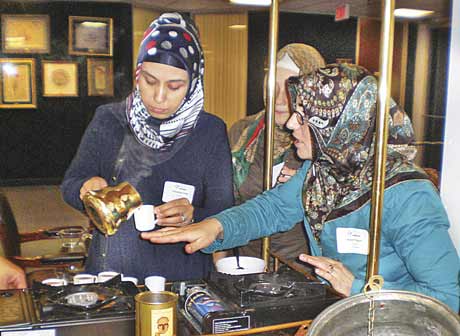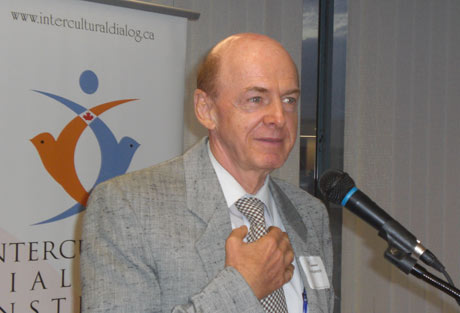Greater Toronto

during Ramadhan
(William Doyle-Marshall pix)
By William Doyle-Marshall
The lack of diversity among members of the Ahmadiyya Muslim Jama'at of Canada has resulted in a strong appeal for change by President Lal Khan Malik. During his sermon to the congregation as the month of Ramadhan came to a close last week he called on the community to become a true reflection of society.
He brought to their attention the lack of diversity in the ranks. Admitting that he was troubled by this vast majority of the gathering coming from the Indian sub-continent, Malik continued, "a visitor who sees us would undoubtedly consider us as a gathering of some Pakistanis or Indians with a few Bengalis".
"Would that be a true reflection of what we really are or what we profess to be? Certainly not! Ours is not a regional but a truly International Community," Lal continued.
Holding himself responsible for his failings and shortcomings, Lal said they all have to shoulder the responsibility for this lapse. On the day of Eid, he took the unusual step of pleading to Ahmadi couples, especially the newlyweds, to show patience and restraint in their family affairs. Emphasizing the great responsibility parents of newlyweds have of making peace, wherever they observe a friction developing, the President warned "those who will not pay heed to this humble advice, would become an impediment to our Tabligh efforts."

dinner during Ramadhan
(William Doyle-Marshall pix)
"It is very difficult for an Ahmadi, whose own house is on the brink of collapse, whose own children have gone astray, to invite someone else to become an Ahmadi," Lal concluded.
Ahmadiyya Muslim Jamaat, the Turkish community as well as the International Muslim Organization here joined millions in Islamic communities worldwide in traditional observance of Ramadhan.
Tony Ruprecht MPP said that the Turkish community for many years is trying to overcome differences and find similarities within human beings. As the keynote speaker at an Iftar dinner organized by the Turkish Intercultural Dialogue Institute, he acknowledged the institute's on-going meetings, seminars and other assemblies as only part of the real work.
"What happens on the bottom is much more important and that is, what shows up here is really the meaning of what goes on and that is the desire and the determination and the self-discipline to try to, as Christians [do], love your God with all your heart and your might and your soul and love your neighbour as yourself," he stressed.
The Institute's programmes are not limited to Ramadhan. Throughout the year it organizes various functions and activities such as the Meet Your Neighbour Programmes and promotion of Noah's Pudding that is made from 40 different ingredients. It is believed at the time of the major flood when Noah was ordered by God to take his family into the ark, and they were running out of food, they created a pudding by mixing together bits and pieces from different foods. Today it is known as Noah's Pudding. In Turkey and in the Middle East every year the people bake the pudding which is shared among neighbours.
Dr. Hamid Slimi the Imam, Resident Scholar and Founder of Sayeda Khadija Centre, addressing an Iftar dinner on the theme "Social Justice in Relationship to Fasting", reminded the audience that Islam is based on five pillars comparable to the pillars of a building. Referring to one about the "The Oneness of God" he said Muslims do not see any contradiction between the teachings of Moses, Jesus or Prophet Muhammad because they were messengers of God.
Dr. Slimi just returned from a visit to Turkey which he said represents multiculturalism and tolerance. He told the gathering, history does not always present the whole view of what the country is all about. But by living with the people and mingling 'in the now' naturally, "we realize how close we are".